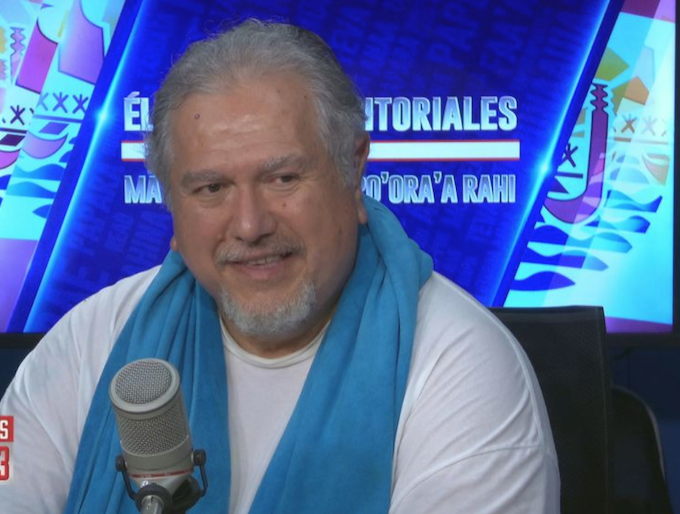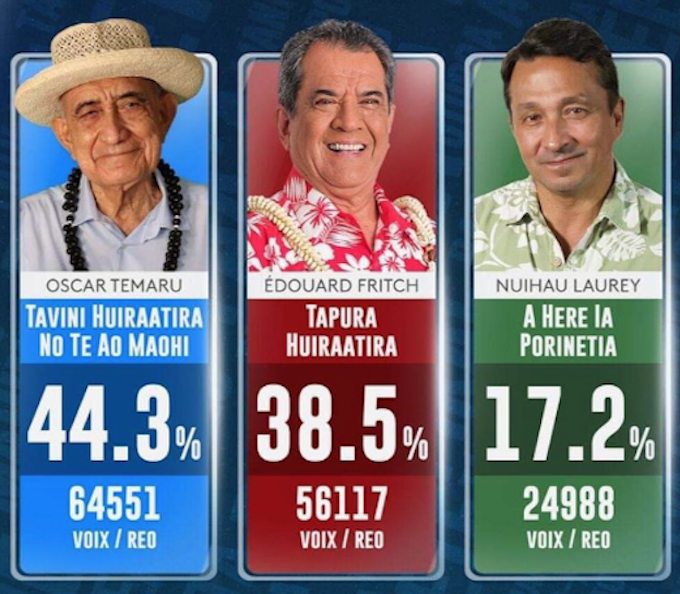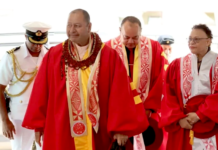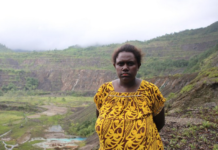
SPECIAL REPORT: By Ena Manuireva
Mā’ohi Nui’s blue wave of the pro-independence Tavini Huir’atira has won its bet — to be back in the helm of the country alone with this convincing victory.
With such a decisive result, the 57 parliamentary seats in the Territorial Assembly will be distributed as follow: 38 seats (including the majority premium of 19 seats) will be allocated to Oscar Temaru’s Tavini while the autonomist alliance of Tapura-Amuitahira’a will collect 16 seats and the last 3 seats go to A here ia Porinetia.
The second and final round had a participation of nearly 70 percent, higher than the 2018 elections which was around 67 percent. Tavini Huira’atira led its closest challenger by more than 8000 votes in the provisional results.
- READ MORE: Tahiti’s pro-independence party tops vote — another winning streak?
- Other Tahiti election reports
This win is a political tour de force with noticeable achievements that need to be mentioned.
Firstly, the Tavini Huira’atira has run alone in a voting system intentionally designed for an autonomist victory, and even the last-minute alliance between sworn enemies — the outgoing President Édouard Fritch and former President Gaston Flosse did not sway the electorate this time.
This comfortable majority of 38 seats will put an end to the political “nomadism” that saw previous parliamentarians cross the floor to join the opposition, triggering endless votes of no confidence.
This was the case in 2004 when the Tavini Huira’atira was in power with a coalition partner.
Opposition scaremongering
Secondly, Tavini Huira’atira has communicated during its campaign that the binary political argument instigated by the main opposing party that independence equals poverty while autonomy means more finance from France is pure scaremongering.
By staying away from that argument, Tavini Huira’atira was able to concentrate on its main message — to give back to the Mā’ohi people ownership of their land and the natural resources.
Thirdly, Tavini Huira’atira has well understood that this election was about coming first, whether by 1 vote or 1000 votes and organising relentless electoral campaigns throughout Mā’ohi Nui has paid dividends.

Once more Oscar Temaru, despite his age (78), has spearheaded those political meetings and rallies like he did during those antinuclear protests some 50 years ago.
Along with those political engagements, putting Moetai Brotherson forward as the new president has ensured the transition to a younger generation to run the country, but most of all a political figure with no condemnation, a quality upon which the Tavini has run its campaign.
In his final speech from his town hall of Faa’a, Oscar Temaru thanked all the trusted constituents who have shown their support for the past 50 years.
He also said that the good old days were over, signaling to the French administration that the dialogue would be under new terms as equal partners.
Many non-voters
There were more than 210,000 registered voters but only 144,000 actual votes which still shows a high rate of the population did not vote.
Le grand perdant de cette élection est donc le Tapura. Après presque deux mandats, Edouard Fritch retrouvera les bancs de l’Assemblée de la Polynésie. Le groupe est réduit de plus de la moitié. La stratégie de réconciliation avec Gaston… Tahiti Polynesie https://t.co/q4s14GilkM pic.twitter.com/2RCcNvAfox
— polynesiela1ere (@Polynesiela1ere) May 2, 2023
Where did it go wrong for the autonomist parties?
As expected, a dejected Tapura-Amuitahira’a party and an ex-president-to-be Édouard Fritch said that this defeat was the price that the autonomist platform was paying for not being united and de facto handing the victory to the independence party.
He acknowledged himself that his alliance with Flosse could have given him around 42 percent of the ballots, but in the end the strategy did not work and they only got 38.5 percent.
Fritch bitterly acknowledged that the population — who he insists are a majority of autonomists — would carry the image of an independent country because Tavini would be in power at the Territorial Assembly.
He said that the future of this country was not independence; it needed to remain with their trusted partner within the French Republic.
His disappointment is without doubt aimed at the other autonomist party of A Here ia Porinetia, which decided to run alone and rejected any alliance with Fritch and Flosse.
Opened the door
Tavini can thank the two leaders of A here ia Porinetia, Nicole Sanquer and Nuihau Laurey, for opening the door to victory and running the country.
The new challenges for Fritch and Flosse will be to rebuild the autonomist platform and be an opposition party that will defeat the independence party in the next elections because Mā’ohi Nui is not ready to be independent.
A mea culpa for unpopular measures and actions that the outgoing government had carried out, especially during the covid-19 pandemic, did not feature as reasons for this defeat.
On the contrary, Fritch doubled down, insisting that the independence party had “lied” to the people regarding their ultimate objective — “get rid of France”.
As for Édouard Fritch’s ally, Gaston Flosse, when interviewed regarding the autonomist defeat, he branded the soon-to-be president Moetai Brotherson “a liar” along with Oscar Temaru, and the next president of the Assembly Antony Geros.
The situation prompted the interviewer to cut short the interview.
The newly created and alternative autonomist platform, A here ia Porinetia, has acknowledged their voters totalled around 25,000 and they will have three representatives in the Territorial Assembly.
Constructive, watchful opposition
They want to be a constructive and watchful opposition that will hold the new local government accountable. Nuihau Laurey has rejected an offer made by Moetai Brotherson to work in his government.
French Overseas Minister Gerald Darmanin has congratulated Oscar Temaru and Moetai Brotherson for their victory and stressed that “the Polynesians have voted for change and the French government is acknowledging this democratic choice”.
Here are the likely next steps following this election:
May 1 is Labour Day in Ma’ohi Nui but the official results of the election will be presented in a round press by the representative of the High Commissioner that will spell out the names of those who will sit in the Assembly from all three parties.
On the May 11 all the Assembly representatives will take their seats as members of Parliament. They will first elect a new president of the Territorial Assembly who is most likely to be Antony Geros, the mayor of Paea, a district that voted overwhelmingly blue.
The autonomist party might present a candidate from their ranks to stand against Antony Geros but this is very unlikely to happen as the opposition party do not have the numbers.
Following the election of the Assembly president (Speaker in the Westminster system), the next most important election to take place will be that of the new President of the territory.
Good for democracy
In this presidential election, Édouard Fritch will likely present himself as the candidate to stand against Moetai Brotherson as it is good for democracy and decorum to have two opposing candidates.
The new President will be elected and will already have formed his new government. He will present the new ministers of his local administration to the public.
It is customary to present the new cabinet either at the actual Presidential Palace in Tarahoi or wherever the new president decides to take residence.
In 2004, Oscar Temaru refused to take residence in the Presidential Palace which he described as an “opulent house made for a dictator” and it was not the house of the people.
Moetai Brotherson has already given some names for his new government and is keen to keep the equality of gender parity but hinted at more women. He also mentioned being interested in taking on the Ministry of New Technologies.
Other likely posts:
- Eliane Tevahitua will be Vice-President and who could inherit the Culture and Heritage ministry;
- Vannina Ateo, who was general secretary for Tavini, will inherit the Civil Service ministry;
- Rony Teriipaia, an academic and expert in the Tahitian language, will be Education Minister; and
- Jordy Chan, who has an engineering background, will be Minister for Big Works and Equipment.
A lot of work awaits this new administration, but the Tavini team seems ready to run the country alone.
Ena Manuireva is an Aotearoa New Zealand-based Tahitian doctoral candidate at Auckland University of Technology and a commentator on French politics in Ma’ohi Nui and the Pacific. He contributes to Asia Pacific Report.













































